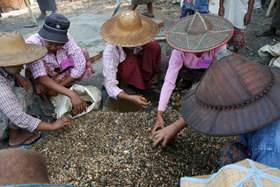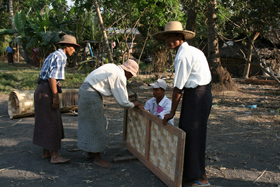Background and Objectives
Background

The Coastal Communities Livelihoods Assistance Programme (CLAP), supported by the Livelihoods and Food Security Trust Fund (LIFT), focuses on pro-poor investment focusing on the creation of community and village based groups of beneficiaries themselves who actively participate in enhancing their income through employment-intensive activities. Such targeted public investments will equip the poor with capacities to participate in growth, which in turn will help them to build their physical, financial, human and social assets to participate in a growing economy. The programme targets 250 villages across five townships in the Delta (Pyapon, Kyailkalt, Bogale, Kungyangon and Dedaye).
Objectives
* Improve the economic well-being of poor and disadvantaged households and communities through employment-intensive in order to provide income and employment opportunities that contribute to longer term economic growth
* Enhance skills of target groups (carpenters, artisans, masons, others) on basic disaster preparedness of the cyclone-affected communities and integrate Disaster Risk Reduction efforts in some of the key sectors of recovery and Empower most vulnerable families – primarily female-headed households - through technical and financial assistance to develop home composting and home gardens to reduce poverty level and raise living standard
* Contribute to the goal of improving the livelihoods of vulnerable local communities by enhancing their productivity and thereby increasing their self-reliance through self-sustained cottage industry
* Rebuild sustainable livelihoods with local ownership while re-establishing the basis for continued sustainable human development in 250 villages, particularly the most vulnerable and disadvantaged groups.
Activities
* A series of employment-intensive community infrastructure works to provide immediate employment opportunities that will pave the way to sustainable livelihood opportunities
* Capacity-building through training that will provide technical and financial support to beneficiaries to improve their skills, acquire techniques to rebuild/repair community infrastructure, to obtain cleaner environment through waste management, home composting and home gardens hence provide in the short/medium/long term services to their communities
* Cottage industry that will build and improve economic sustainability for the poorest and the most vulnerable people living in urban and peri-urban areas expecting that they will become able to independently support their families in the future
Results

Immediate employment opportunities in community infrastructure that will enhance sustainable livelihood opportunities through employment intensive
Improved skills and short/medium/long term employment as a result of capacity-building to rebuild/repair shelter and community infrastructure strengthened with techniques and skills that will help obtain cleaner environment through waste management, home composting and home gardens hence provide in the short/medium/long term services to their communities
Employment generation and improved and sustainable economy for poorest and the most vulnerable through implementation of cottage industry
* Village access roads and footpaths upgraded
* Flood protection embankment upgraded/built
* Drainage/sewer in the villages upgraded
* Bridges and jetties in the villages upgraded/built
* Drain cleaning and excavation of culverts
* Approximately 264,000 person days of jobs created
* Quality of life in project locations improved
* Investment decisions are pro-poor and decision-making is participatory and inclusive
* Local artisans trained and provided with tool kits
* On-the-ground training through rebuilt/repair shelters pilot projects
* A cascade training model in which trainer of trainers receive training and then train others in
* Communities understand and manage their hazards to reduce and mitigate their risks
* Basic community level disaster preparedness and awareness enhanced in 250 villages
* HHs trained on technical know-how on how to make compost pit for garbage disposal
* HHs provided with technical support about home gardens and compost sites created
* People provided with basic training in the area of cottage industry, small business and finance management
* Cottage industries established in targeted villages
* Improved production of locally available building materials and livelihoods opportunities through
* Local building materials and build back safer techniques transferred
* Strong local ownership built on trust and empowerment
* The assets of cottage industry using during the project will be kept by the community for medium/long term sustainability
Development Partners / Partners
Development Partners: LIFT (Multi Donor Trust Fund for Livelihoods and Food Security Trust Fund)
- The Project for Emergency Support to Poor and Vulnerable Communities in Ethnic Areas
- A Short Step from Improved WASH to Healthier Communities
- The Programme for Emergency Assistance to Poor and Vulnerable Community in Ethnic Minority Areas and Yangon
- Safe and Sustainable Access to WASH for Rural Communities
- Shelter Recovery Programme – Post Giri Affected Areas
- Shae Thot ‘The Way Forward’
- Land Administration and Management Programme (LAMP) in Myanmar
- Safer Coastal and Urban Communities through DRR in Myanmar
- Disaster Risk Reduction for Safe & Resilient Burmese Coastal Communities
- The Programme for Development and Rehabilitation of Community in Ethnic Minority Area, Myanmar
- Myanmar Climate Change Alliance (MCCA)
- Rebuilding Homes-Rebuilding Lives – Coastal Settlements Sustainable Recovery (CSSR)
- Rebuilding Homes-Rebuilding Lives – Coastal Settlements Support Programme (CSSP)
- Coastal Communities Livelihood Assistance Programme (CLAP)
- Disaster Response & Preparedness – Resilient Coastal Communities and Urban Risk (DRP-CURB)
- Shelter Improvement and Disaster Risk Reduction Project
- Community Water Supply and Sanitation Recovery
- Community Based Disaster Risk Reduction (CBDRR)
- Support to the Coordination of Early Recovery Shelter Interventions-Shelter Cluster Lead
- Semi-permanent Schools in Ayeyarwady Delta in Myanmar / Multi-purpose Schools in Ayeyarwady Delta in Myanmar






































